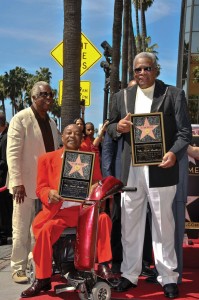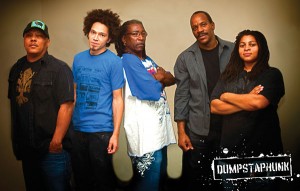What the Funk?

By Nancy Buchan
When my godson Travis called and invited us to his wedding in Los Angeles, and asked me to play the violin for the ceremony, I was thrilled at the prospect of getting out of the relentless rain here and honored to be asked to play for his nuptials. After all, he asked Kate to marry him while on the beach in Dominical last year, after waiting 5 days for the perfect sunset! Both of them musicians, they even sat in with the Howlers one Wednesday night at Dos Locos! As an extra incentive to get me to California – like I needed one – he said the reception/party band was The Funk Brothers, and that after I played for the ceremony, surely I could sit in with them. And that there would be cool food trucks doing the catering. And that it would not rain.
Now, I did of course realize that this could not be the REAL Funk Brothers, ‘cause they’re mostly playing in that big heavenly band by now. The Funk Brothers was the nickname of the most prolific band in recorded history – the Detroit based session players who performed on most Motown Records releases from 1959 until Berry Gordy moved the company to LA in 1972. It’s claimed that the core group of the Funk Brothers (13 ‘official’ musicians were acknowledged by the Grammy people) played on more #1 hits than The Beatles, Elvis Presley, The Rolling Stones and The Beach Boys combined. They were not so much a band as a group of interchangeable players who were on call for whatever needed to be recorded. Several of them had been jazz players, which accounted for the innovative techniques they used. James Jamerson is a good example – he would record a bass track on an upright acoustic bass, then overdub it with an electric Fender Precision bass. He was so skillful that most people couldn’t tell it was two parts. They often used two drummers or unusual percussion instruments, and always came up with supportive parts to showcase the Motown singers. Read the book or watch the documentary called “Standing in the Shadows of Motown” to get an idea of how creative and influential these guys were. Berry Gordy ran the show – this was not a democratic musical endeavor. Although everyone knew them as the Funk Brothers, Gordy didn’t like that word so when he did acknowledge their contributions (which was rare), he called them Earl Van Dyke and the Soul Brothers. The musicians were paid $10 per song, no matter how long it took to record, and if Gordy heard of anyone playing on another labels recording he would fine them. In 1972 Gordy moved the entire label to LA, a fact the musicians discovered when they showed up to work and read a notice on the door. Some of the cats tried LA, but most found it an uncomfortable fit and returned to relative obscurity in Detroit. A shameful way to treat the musicians who gave us “Heard it Through the Grapevine”, “Baby Love”, “Ain’t No Mountain High Enough” and literally hundreds of other great songs by artists like Stevie Wonder, the Supremes, the Four Tops, Smokey Robinson & the Miracles, Martha & the Vandellas, the Isley Brothers, the Temptations, Gladys Knight & the Pips and Marvin Gaye. They were truly the SOUL behind the sound, and their like will not be seen again….
So I was fascinated to see what kind of musicians would presume to use the name the Funk Brothers, and I was not disappointed. The band was a grouping of eight well-respected performers and session players in LA, and I was happy to discover that they took the same approach to the gig as their namesakes had all those years ago. The two lead singers did not overshadow the band, the horn section did not overpower the songs, and the rhythm section was tight and consistent. Not much ego was involved. It was a team – didn’t matter whether they were old pals or if they had just met each other, they were a team whose goal was to produce the best sound possible behind the vocalists or on an instrumental piece. Everybody did their job.
Now, musicians don’t generally like the word job, and we spend a lot of time trying not to have one. But the reality is that each musician has a specific job to do within the ranks of a band. Sometimes we learn this the hard way – we all know great players who sabotage themselves and the overall sound of the band by playing too much instead of playing the right thing. Or by just not understanding the concept of being part of a unified, artistic group endeavor. Sure, the drummer is supposed to keep a consistent beat, but he or she should also have big ears and be able to follow the singer or instrumental soloist if they are having a particularly inspired night. The rest of us have to lock into what the drummer is doing, and he has to find the groove – the pulse of the song that makes the whole thing work. When someone is singing or playing a lead, everyone else should be contributing to the song by either shutting up or by playing minimal consistent parts. The guitar player or keyboard player should help with the rhythm and stay out of the way of the singers or other soloists, which can be done by voicing your part higher or lower in pitch. Ya’ just can’t get carried away with yourself – it’s all about defining your job and sticking to it selflessly. Have a good attitude, be on time, know the material, have good equipment, have some fun and do your job!! I had a great time sitting in with these guys, and tried to do all the things I preach about!

There will be plenty of fun to be had at the 4th annual Jungle Jam in Jaco, this coming January 16th – 19th. The guys at Doce Lunas (where it is held) have really upped the ante this year with more variety and number of groups playing, camping, hotel packages, and beach and downtown venues. I have gone the past 3 years and it is a blast – very well organized with some great acts, is kid friendly and in a beautiful setting. Particularly exciting to me is the first appearance of New Orleans band Ivan Neville and Dumpstaphunk here in Costa Rica! Go to their website and check it out – www.junglejam.com I’ll be writing more about the specific talent this year in next months’ article. In the meantime, come hear singer, songwriter and guitarist Ben Orton and myself and a bunch of other monkeys at the beautiful and spacious Roca Verde Bar and Restaurant in Dominical – we play most Friday nights starting at 7:30 pm.
“The way a team plays as a whole determines its success. You may have the greatest bunch of individual stars in the world, but if they don’t play together, the club won’t be worth a dime.” Babe Ruth
“I’ve got the big name, but I’ve always wanted to be in a band, one of a band.” Robert Plant
“One man can be a crucial ingredient on a team, but one man cannot make a team.” Kareem Abdul-Jabbar
